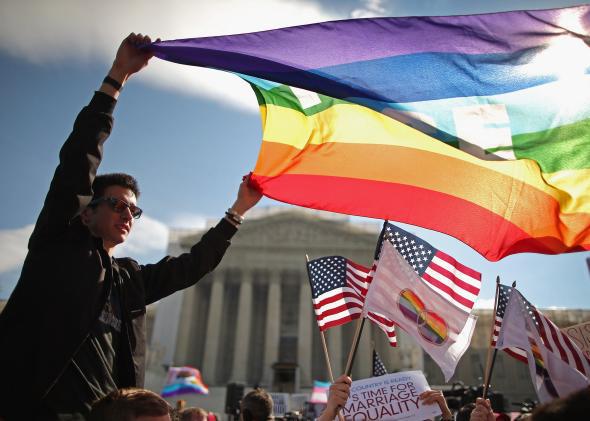The justices of the U.S. Supreme Court meet on Monday to consider whether they should tackle the issue of same-sex marriage this term or give the lower courts more time to grapple with the question and flesh out the legal theories involved. What is perhaps most interesting about the evolution of this issue is that to date all the courts addressing the question have missed one remarkably simple proposition: Bans against same-sex marriage are unconstitutional as a matter of law because they punish children in an effort to control the conduct of adults.
Punishing children for matters beyond their control is patently impermissible as a matter of Supreme Court precedent regarding the constitutional rights of children. In the first of these cases, the court considered a Louisiana law that forbade children born out of wedlock from receiving benefits upon the wrongful death of their mother. Louisiana argued that the law was a perfectly legitimate means of expressing moral disapproval of extramarital liaisons. The Supreme Court, however, determined that the law violated equal protection because it is fundamentally unfair and irrational for a state to deny important benefits to children merely to express moral disapproval of the conduct of adults—or to incentivize adults to behave in a particular way.
In a similar case decided several years later, the court addressed another Louisiana statute that intentionally disadvantaged children born out of wedlock. Specifically, the law at issue preferred “legitimate” children to “illegitimate” children in distributing worker’s compensation benefits upon the death of a parent. The court invalidated the statute, holding that, under the equal protection clause, both classes of children must be permitted to recover equally. “No child,” the court wrote, “is responsible for his birth and penalizing the illegitimate child is an ineffectual—as well as unjust—way of deterring the parent.”
In yet another case decided a decade later, the court relied on the same logic in holding that states could not constitutionally deny public education to undocumented immigrant children in an effort to discourage their parents from entering the country illegally. The constitutional conclusion from this line of cases is clear: No matter how reprehensible a state finds certain adult conduct, it cannot curb that conduct through laws that punish children.
The parallels between the laws struck down in these cases and bans against same-sex marriage are unavoidable. States that ban gay marriage once argued that they did so in order to condemn homosexuality; today, they argue that gay marriage must be forbidden in order to somehow incentivize straight marriage. No matter the rationale, the effect of these laws is clear: Gay marriage bans deny the children of same-sex couples critical benefits, both economically and psychologically. Even if one believes that gay marriage bans are a justifiable effort to control the conduct of adults, it is simply unconstitutional to punish children based on that belief.
In 2013, we filed an amicus brief explaining why the court’s child-centered equal protection precedent should make United States v. Windsor an easy case to decide. But while Justice Anthony Kennedy did discuss harm to children in his groundbreaking Windsor opinion, he did not explicitly recognize the legal theory that the harm to children alone should render gay marriage bans unconstitutional.
Why have the courts avoided this remarkably straightforward basis for resolving the issue? One reason, we suspect, is that when many gay marriage bans were passed in the late 1990s and early 2000s, legislatures were not necessarily aware that same-sex couples were raising children and never considered the impact that these discriminatory laws would have on children. Because the idea of same-sex couples raising children is still relatively new (to some), courts have not made the connection between gay marriage bans and discrimination against children.
Today, however, the deeply detrimental effect of these bans on gay couples’ children is perfectly clear. And the Supreme Court should not ignore the unconstitutional implications of this harm when it considers marriage equality at the state level.
